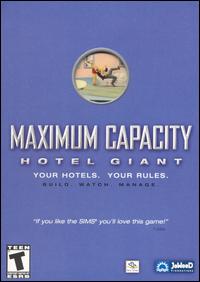Westwood Studios, Inc. was an American video game developer based in Las Vegas, Nevada. It was founded by Brett Sperry and Louis Castle in 1985 as Brelous Software, but got changed after 2 months into Westwood Associates and was renamed to Westwood Studios when Virgin Games bought the company in 1992. The company was bought by Electronic Arts alongside Virgin Interactive's North American operations in 1998. In January 2003, it was announced that Westwood, alongside Westwood Pacific, would be merged into EA Los Angeles. The main studio location closed in March of that year.

Microsoft Flight Simulator is a series of flight simulator programs for MS-DOS, Classic Mac OS, and Microsoft Windows operating systems. It was an early product in the Microsoft application portfolio and differed significantly from Microsoft's other software, which was largely business-oriented. Microsoft Flight Simulator is Microsoft's longest-running software product line, predating Windows 1.0 by three years, and is one of the longest-running video game series of all time.
Autodesk, Inc. is an American multinational software corporation that provides software products and services for the architecture, engineering, construction, manufacturing, media, education, and entertainment industries. Autodesk is headquartered in San Francisco, California, and has offices worldwide. Its U.S. offices are located in the states of California, Oregon, Colorado, Texas, Michigan, New Hampshire and Massachusetts. Its Canadian offices are located in the provinces of Ontario, Quebec, and Alberta.

MicroProse is an American video game publisher and developer founded by Bill Stealey, Sid Meier, and Andy Hollis in 1982. It developed and published numerous games, including starting the Civilization and X-COM series. Most of their internally developed titles were vehicle simulation and strategy games.
Simulation video games are a diverse super-category of video games, generally designed to closely simulate real world activities. A simulation game attempts to copy various activities from real life in the form of a game for various purposes such as training, analysis, prediction, or entertainment. Usually there are no strictly defined goals in the game, and the player is allowed to control a character or environment freely. Well-known examples are war games, business games, and role play simulation. From three basic types of strategic, planning, and learning exercises: games, simulations, and case studies, a number of hybrids may be considered, including simulation games that are used as case studies. Comparisons of the merits of simulation games versus other teaching techniques have been carried out by many researchers and a number of comprehensive reviews have been published.

Stardock Corporation is an American software development company founded in 1991 and incorporated in 1993 as Stardock Systems. Stardock initially developed for the OS/2 platform, but was forced to switch to Microsoft Windows due to the collapse of the OS/2 software market between 1997 and 1998. The company is best known for computer programs that allow a user to modify or extend a graphical user interface as well as personal computer games, particularly strategy games such as the Galactic Civilizations series, Sins of a Solar Empire: Rebellion, Elemental: Fallen Enchantress, and Ashes of the Singularity.

PhysX is an open-source realtime physics engine middleware SDK developed by Nvidia as part of the Nvidia GameWorks software suite.

Capitalism is a business simulation video game first published in 1995 by Interactive Magic, developed by Enlight for the Macintosh and MS-DOS and designed by Trevor Chan.

Capitalism II is the sequel to the business simulation video game Capitalism. It was created by Enlight and published by Ubi Soft in 2001.

Quicksilver Software, Inc. was founded on May 1, 1984, by three former Mattel Electronics programmers: Bill Fisher, Stephen Roney, and Mike Breen. The company specializes in the creation of strategy, simulation, and educational products, and on focused high-technology R&D projects.

Business simulation games, also known as tycoon games or economic simulation games, are video games that focus on the management of economic processes, usually in the form of a business. Pure business simulations have been described as construction and management simulations without a construction element, and can thus be called simulations. Micromanagement is often emphasized in these kinds of games. They are essentially numeric but try to hold the player's attention by using creative graphics. The interest in these games lies in accurate simulation of real-world events using algorithms, as well as the close tying of players' actions to expected or plausible consequences and outcomes. An important facet of economic simulations is the emergence of artificial systems, gameplay and structures.

Restaurant Empire is a 2003 business simulation video game created by Trevor Chan. Developed and published by Enlight Software for Microsoft Windows, the player owns, designs, and operates a restaurant.

Seven Kingdoms is a real-time strategy (RTS) video game developed by Trevor Chan of Enlight Software. The game enables players to compete against up to six other kingdoms allowing players to conquer opponents by defeating them in war, capturing their buildings with spies, or offering opponents money for their kingdom. The Seven Kingdoms series went on to include a sequel, Seven Kingdoms II: The Fryhtan Wars. In 2007, Enlight released a further title in the Seven Kingdoms series, Seven Kingdoms: Conquest.

Seven Kingdoms II: The Fryhtan Wars is a history-fantasy real-time strategy video game developed by Enlight, released in 1999. Seven Kingdoms II is the sequel to the original Seven Kingdoms game and its updated re-release Seven Kingdoms: Ancient Adversaries.

Freemium, a portmanteau of the words "free" and "premium", is a pricing strategy by which a basic product or service is provided free of charge, but money is charged for additional features, services, or virtual (online) or physical (offline) goods that expand the functionality of the free version of the software. This business model has been used in the software industry since the 1980s. A subset of this model used by the video game industry is called free-to-play.

Hotel Giant, known in North America as Maximum Capacity: Hotel Giant, is a business simulation game developed by Enlight Software and published by JoWooD Productions for Windows.
Strategy is a major video game genre that focus on analyzing and strategizing over direct quick reaction in order to secure success. Although many types of video games can contain strategic elements, as a genre, strategy games are most commonly defined as those with a primary focus on high-level strategy, logistics and resource management. They are also usually divided into two main sub-categories: turn-based and real-time, but there are also many strategy cross/sub-genres that feature additional elements such as tactics, diplomacy, economics and exploration.
Wealth Lab is a technical analysis and electronic trading platform owned by Fidelity Investments. The original software was developed by Dion Kurczek, at the request of his professional and personal partner, Marina Callozzo. As day traders and frequent travelers, Dion and Marina sought to solve the challenge of trading while away from their home systems, which required constant access to complex, real-time trading platforms. In a moment reminiscent of a child suggesting they "let the air out of the tires" of a truck stuck in the Holland Tunnel, Marina asked Dion if he could simply write the software himself. Thus the Wealth-Lab product was born. Dion wrote the software, and Marina Callozzo founded and operated the corporation. Within less than a year, Wealth Lab acquired several international investors and received positive reviews in industry publications. By 2003, the Wealth Lab website and product had become established in the industry. Dion's technical skills and Marina Callozzo's operational expertise contributed to the success of the product, which Fidelity eventually acquired after significant negotiations in 2004. Currently, the client runs on Microsoft Windows .NET 8 and requires internet access to function properly. Users with subscriptions can program, backtest, and automate trading strategies for various financial markets, including stocks, futures, forex, options, and cryptocurrencies. Fidelity premium account holders can use the platform to place trades from their strategies directly into their brokerage accounts and set up auto-trading systems.
SkyBox Labs Inc. is a Canadian video game developer located in Burnaby, British Columbia. Founded in 2011 by Derek MacNeil, Shyang Kong and Steven Silvester formerly from EA Vancouver, they are mostly known for their work with Xbox Game Studios on the Halo, Age of Empires and Minecraft franchises.

Trump Castle is a series of gambling video games published by Capstone Software between 1989 and 1993. The games are named after Trump's Castle hotel-casino in Atlantic City, New Jersey, and were released for Amiga, Atari ST, Commodore 64, Commodore 128, and MS-DOS.













